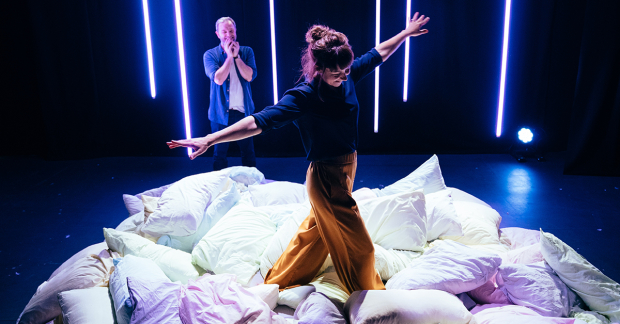Review: Rust (Bush Theatre)
Kenny Emson’s new play opens at the west London theatre ahead of a run in Edinburgh

© Helen Murray
Nadia (Claire Lams) and Daniel (Jon Foster) are, by their own admission, just a couple of boring, white middle-aged people in slowly dying marriages. So how can they inject some passion back into their lives? Their answer is to rent out a studio flat which they can visit every Monday, in order to have passionate, no-strings-attached sex.
In their love haven, they are offered a brief reprieve from their mundane marital routines. Here they don't have to talk about their partners or their children. Nor do they have to pretend to be fascinated by true crime shows on Netflix or spend time searching for activities to fill each weekend that rolls by. But what initially seems to be the perfect solution inevitably begins to stretch and strain under the pressures of the outside world.
Max Johns' design is simple; a huge mound of pastel-coloured pillows heaped up on the floor, reminiscent of the leaf piles you might have made as a kid in the autumn time. The lighting design is also simple; Jess Bernberg uses six long LED strips hanging from the ceiling, which create a lit passageway – the entrance to the studio flat. Still, the actors are left with a lot to play with. Whilst the majority of the show takes place on the large heap of pillows, director Eleanor Rhode has some scenes play out at the sides of the stage. During these scenes, our attention is still drawn to the now crumpled pillows, which have been charged with memories of lust, love broken promises and fights.
At the heart of it all, this is a play about two people who want (or at the very least, claim that they want) more. More excitement. More freedom. More love. Nadia and Daniel attempt to achieve this by trying to push against convention and by trying to recapture their youth; Nadia in particular dances on tables and drinks in the afternoon, despite her various work commitments. Lams easily taps into Nadia's burdened yet adventure-seeking personality, and Foster is heart-warming in the more blundering, ‘play it safe' character of Daniel. Both of them are scared of what growing up means for them – bills, Chinese takeaways, parental duties and boring sex lives. Unfortunately, the heart of the show is easy to forget among all the other things it promises – Rust aims to be a contemporary and sexy show that pushes the bounds of lust and love.
However, it's more accurate to say that the show blurs the lines between lust and love. Rust shows us a meeting between two people who genuinely care for each other. They exchange tender kisses, gifts, banter, and despite their efforts not to, the dreaded L word. Kenny Emson's writing deliberately steers clear of any overly sexual scenes – we always see the moment before or the moment after. There are some passionate kisses and the occasional talk of something more explicit, but the couple spend most of their time in domestic arguments as tensions rise high. The script is gorgeously written; the dialogue is witty and the humour is sharp. Yet it doesn't deliver the exciting, blood-rushing atmosphere one might expect from a show that explores the nature of lust.
But perhaps that's the point. After all, the characters spend more time reveling in their fantasies rather than actually realising any of them – whether it's the wild sex they want to try one day, or the standards of marital life that they dream about overturning. Rust has quite a damning message; that monogamy is almost always boring. Even Nadia and Daniel slip back into the same habits they are trying to escape; daytime television, avoiding sex with one another and falling into their own domestic routine.
However, Rust does feel like it could push itself further. It stops just shy of pushing the boundaries of traditional monogamy, but also pulls away from celebrating it. It approaches the topic of sex, without quite managing to be sexy. It brushes past gender stereotypes and the imbalanced reactions to infidelity that fall more harshly on mothers than on fathers, and only briefly touches on the moral choices of these characters in terms of their relationship with their spouses.
Despite this, Emson steers clear from the more predictable twists and turns that Rust could have easily been trapped in, and the characters are believable and sympathetic.


















